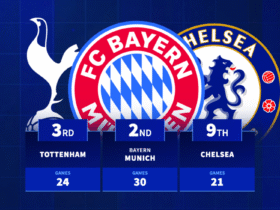<div>
<p>Liverpool 2nd</p>
<div>
<p>
<img alt="Last 10 seasons analysed - Which clubs tend to have the best starts to a Premier League season?" src="https://tmssl.akamaized.net//images/foto/galerie/arteta-spotlight-1711624548-133000.png" title="Last 10 seasons analysed - Which clubs tend to have the best starts to a Premier League season?">
</img>
</p>
</div>
<p dir="ltr">
In English football, there's a longstanding belief that league standings aren't meaningful until after matchday 10. Early-season stumble, adapting new players, and managers still figuring out their ideal lineups can lead to unpredictable results in the initial weeks of a new Premier League season. However, by the time teams have played 10 matches, fans usually have a clearer picture of which clubs are on the ascent and which are in danger of relegation.
</p>
<br></br>
<p dir="ltr">
With this in consideration, <em>Transfermarkt</em> has reviewed the past 10 league seasons to identify which clubs tend to get off to a strong start in the Premier League, gaining an early edge over their rivals. Last season, for example, Liverpool led the table with a two-point advantage, while two of the three teams that were eventually relegated found themselves in the bottom three early on. So, as the English top-flight prepares to return, let’s explore which clubs are likely to be in strong positions 10 matchdays from now.
</p>
<br></br>
<p dir="ltr">
<img alt="PL first ten games" height="629" src="https://tmssl.akamaized.net//images/foto/newsansicht/pl-first-ten-games-1755098455-174756.png?lm=1755098465" title="PL first ten games" width="503"></img>
</p>
<br></br>
<p dir="ltr">
Unsurprisingly, the usual suspects dominate the top of the table when it comes to the highest average points per game after the first 10 matches over the last decade. Manchester City ranks first with an impressive 2.32 points per game, followed closely by Liverpool (2.12) and Arsenal (2.01). This indicates that, on average, Pep Guardiola’s side leads Mikel Arteta’s by about three points after 10 games, followed by a noticeable drop to the other teams.
</p>
<br></br>
<p dir="ltr">
Interestingly, Tottenham occupies the fourth position despite only finishing in the top four five times over the last ten seasons. This suggests that Spurs typically start strong but can falter later in the campaign. Given that they've only finished in the top six for points accrued in the second half of the league season once in the past five years, their pattern is evident.
</p>
<br></br>
<div>
<p>Club Comparison</p>
<div>
<p>Premier League</p>
<p>Premier League</p>
</div>
<div>
<p>€892.20m</p>
<p>Market Value</p>
<p>€832.10m</p>
</div>
<br></br>
<div>
<p>First Tier</p>
<p>League Level</p>
<p>First Tier</p>
</div>
<br></br>
<div>
<p>€229.70m</p>
<p>Expenditures 25/26</p>
<p>€145.60m</p>
</div>
<br></br>
<div>
<p>Ruben Amorim</p>
<p>Managers</p>
<p>Thomas Frank</p>
</div>
<br></br>
<p><span>Full Club Comparison</span></p>
</div>
<p dir="ltr">
Manchester United fans should also take note of their position, sitting sixth but significantly trailing behind fifth-placed Chelsea with an average of only 1.68 points per game. Unlike Tottenham, the team at Old Trafford tends to perform better in the latter half of the season, which is why they have finished in higher places five times in the last decade. Nevertheless, these statistics illustrate how slow starts to the league often hinder their chances of breaking into the top four or contending for the title.
</p>
</div>













Leave a Reply
View Comments